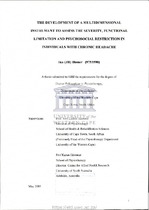| dc.description.abstract | Headache disorders constitute a public-health problem which impacts on individuals and society. The functional limitation and psychosocial restriction, caused by chronic headache, may be a more reliable indication of the severity of the disorder than the pain intensity and temporal headache pattern itself. Evaluation of all these parameters may improve health care for individuals suffering from chronic headache. The ultimate purpose of this study was to develop and validate a multidimensional questionnaire to assess the severity and impact of headache in individuals suffering from chronic headache. The study was carried out in six phases, each stage building on the previous ones. A quantitative retrospective review of 450 patients' clinical files was executed to identify the elements of complaint of these patients. This was followed by a literature review of existing headache-related health measures and construction of a theoretical framework for the study. A questionnaire was developed based on these findings. This questionnaire was then tested for face and content validity in a chronic headache population sample (n=60) and physiotherapists working with these patients (n=18). The questionnaire was further refined by a small qualitative
study, making use of small group discussions (n=10). After the suggested modifications were made, the Multidimensional Chronic Headache Questionnaire (MCHQ) was tested for stability in a group of chronic headache patients (n=21), who completed the questionnaire twice with a one-week intervening period with no intervention. It was then tested for responsiveness, where patients completed the questionnaire prior to, and after, an episode of treatment. The Wilcoxon Signed Rank Sum Test was used to detect significant differences (and hence responsiveness). Lastly, all the MCHQ's (n=148) that were completed during the course of the study were analised to establish the homogeneity of item content (Chronbach alpha values), and the construct validity of the instrument in terms of item structure (exploratory factor analysis). The retrospective review of patients' perceptions of the severity and impact of their chronic headache indicated that many of the patients experienced moderate to severe limitation of function and psychosocial restriction. Although many domains of headache-related health were represented in published questionnaires reviewed for this study, no instrument that assesses both the perceived severity
and a wide range of impact was found. The MCHQ was developed from this study to measure these parameters. The items in the questionnaire were based on the retrospective study and existing questionnaires utilised in the chronic headache population. The face and content validity of the first draft of the instrument was found to be good. The stability of the questionnaire was very good, with Pearson's
correlation coefficients of greater than 0.9334 for all repeated items. Responsiveness was very good, with all items found to be responsive to change (with probability values of p<O.OOOI for all but 3 items; these being effect of analgesics, triggering factors and impact on relationships). Homogeneity of item content was good (alpha values all >0.6647), and preliminary construct validity was suggested by demonstration of eight distinct factors that were clearly interpretable (one in the severity and seven in the impact domain). These
suggested that severity is unidimensional, and that seven dimensions of impact are assessed in the MCHQ (functional limitations, two emotional dimensions, relationship restrictions, and three headache trigger dimensions). Positive linear correlations between severity and impact suggested that the higher the severity, the more severe the impact on the individual's quality of life (r=0.5183; p<.OOOI). These tests suggested preliminary construct validity for the questionnaire. The researcher concluded that severe and frequent headache has a considerable impact on the individual and that the multiple facets of headache-related health can be measured appropriately using this instrument. The Multidimensional Chronic Headache Questionnaire is a new instrument to assess headache-related health in terms of both
severity and multidimensional impact on individuals, which can be utilised in a once-off health assessment as well as an outcome measure for therapy. | en_US |

